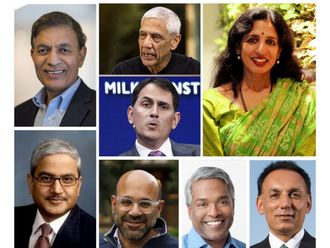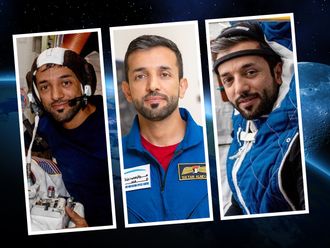
Dubai: When the ground beneath your feet shakes, what do you do?
- Run for cover.
- Find someone else to blame.
- Learn to live with it and break some bad habits along the way.
When an AI-driven robot gets "trained" enough to completely write these lines you're reading now, what happens to human writers like me?
As ridiculous as it may sound — like the spread of an AI-generated fake news — it's already happening. And, over time, it's only bound to improve in depth and detail.
They're markers of an unfolding revolution. Harbingers of tectonic shifts taking place at breakneck speeds, sometimes too fast for us to make sense of.
Get this: It took about 10,000 years to go from writing to printing press. It took another 500 years from printing to email. So from email to artificial intelligence (AI), how much longer would it take?
Which AI?
The answer depends on another question: Which AI?
If you drive using GPS, you're sub-consciously already engaged in an AI-assisted human activity. It's already woven into the DNA of our present age.
So an explainer like this, put together by a cyborg, may not be too far behind.
From simple GPS guidance to full self-driving (no human driver) powered by massive cloud-based data, and the pervasiveness of robot-driven factories (machines that make machines) — these may be just around the bend.
Impact of technology on jobs
Given these impending disruptions, our jobs and our comfort zones are about to be reshaped, according to the “Jobs of Tomorrow” report published recently by the World Economic Forum (WEF).
I saw its impact close to home. In the 1990s, I assiduously leant printing techniques in university, but that thing has become irrelevant today.
Printing — movable types invented by Gutenberg in the 1400s and the Chinese, 600 years earlier — revolutionized knowledge. But for my children ages 6 to 12, who belong to the YouTube generation, this "thing", i.e. words printed on dead trees, is just a small distraction.
They have no problems ordering, reviewing toys online on apps (driven by complex algorithms to upsell other products, of course).
The digital revolution — the ability to train supercomputers to analyse, and act upon, massive amounts of data — is impacting various jobs, from stocks trading and remittances to healthcare and engineering; from energy and transportation, to electronics and toys vending.
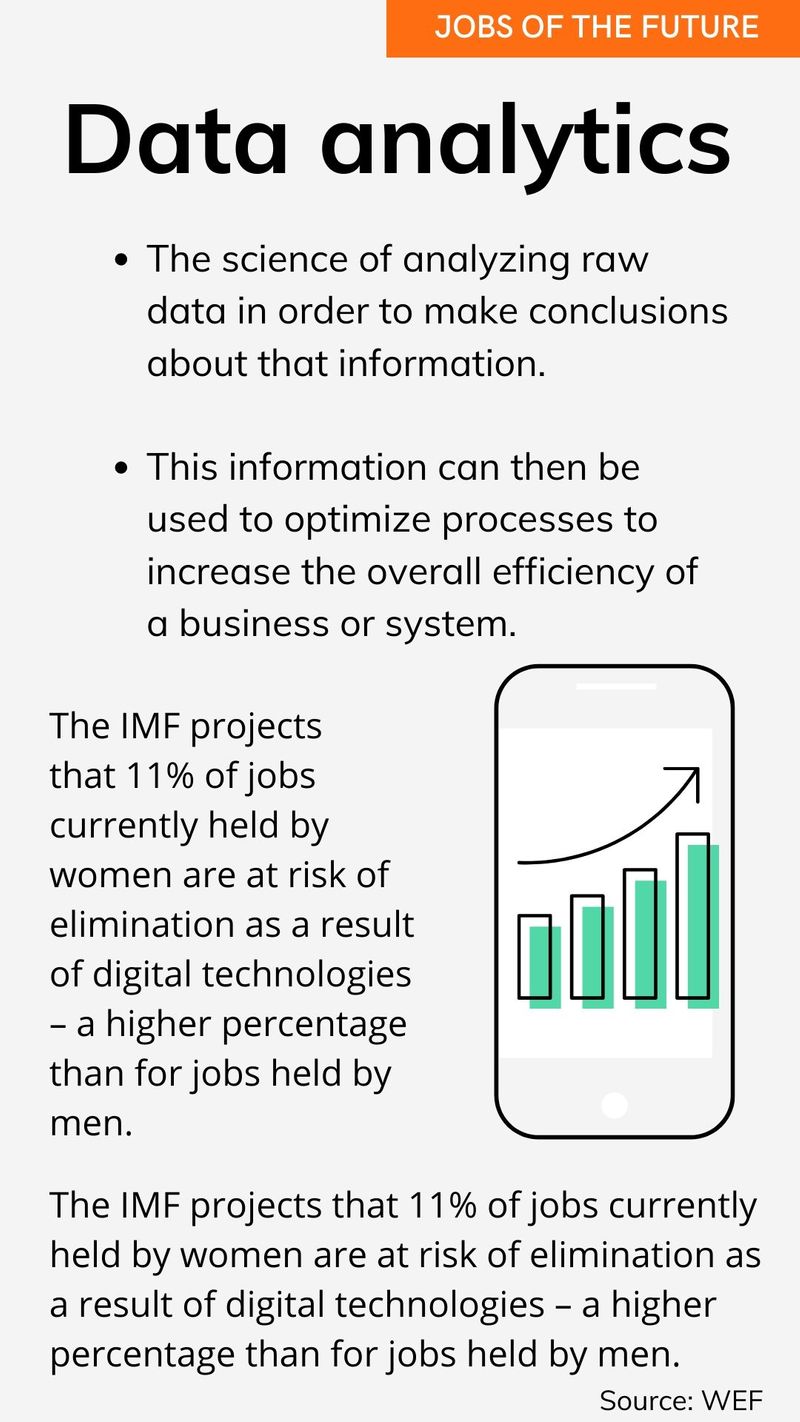
Do we need to be scared?
Given these changes, one is forced to ask:
- Would future jobs take human interactions away?
- Do we ditch the so-called "soft skills"?
- Do we stop caring about each other, especially the old and infirm?
- Do we all have to become AI engineers?
The answer to each question, it turns out, is a simple "No".
The WEF report strongly states that demand for both "digital" and "human" factors will continue to drive growth in the professions of the future.
Yet it's helpful to know these factors, especially when we're tasked to guide young people towards a productive life when they come of age.
Besides, these disruptions aren't really all that bad.
But it's no time to relax, either
They're a natural progression of human civilisation that took us from hunting-gathering to big-city dwelling.
Like the genie out of the bottle, no one can stop man’s awesome creativity and inventiveness — the ability to spin off new, delightful things.
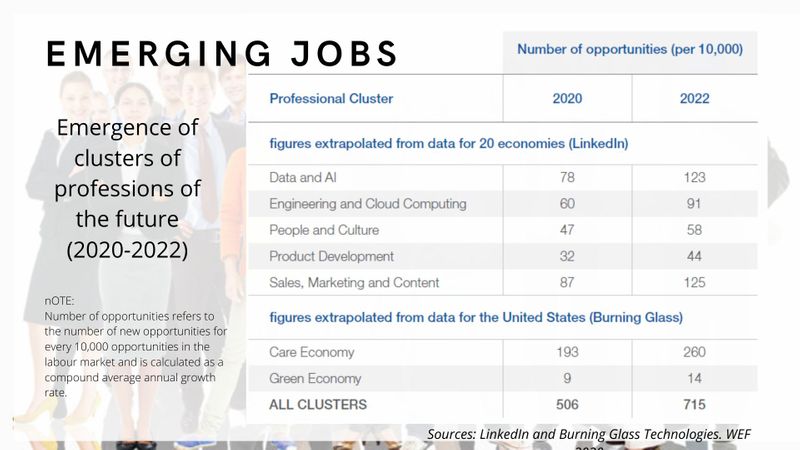
Key Takeaways:
Following are the key takeaways from the recent WEF jobs report, which was prepared by teams from LinkedIn, Coursera and Burning Glass Technologies:
1. HUMAN SKILLS WILL COMPLEMENT DIGITAL SKILLS
Human interaction will continue to play a key role in the new digital economy.
There will be a greater demand for "care economy" jobs, roles in marketing, sales and content production, as well as roles at the forefront of people and culture.
This is good news. It means we're not about to lose our humanity. This "augmented humanity" — where robots and AI-driven wearables (watches, for example) are used alongside human caregivers to look after the elderly, the sick, the weak.
The future of work shows a good demand for a broad variety of skills that match these professional opportunities.
So there's room for disruptive technical skills (think AI specialist or Analytics specialist), specialised industry skills and core business skills as well as human-interaction oriented skills.
2. THE 4th INDUSTRIAL REVOLUTION IS HERE, IGNORE IT AT YOUR OWN RISK
This era is marked by a complex digital economy, humans augmented by artificial intelligence, which can be roughly classified into five "innovation platforms".

Today, it's going to be terribly hard to deny one pulsating reality: AI-driven battery electric vehicles will disrupt internal combustion engines (ICE) the way ICE vehicles disrupted horsepower.
Human genome sciences, powered by supercomputers, will disrupt healthcare in a way that's been never been done before: DNA sequencing is increasingly expected to help treat diseases, cure congenital conditions like paediatric blindness, and lead to longer lifespans.
There's no other way to call it: It's a veritable new revolution.
All four revolutions — the 1st (mechanical), 2nd (electrical), 3rd (internet) and (4th) digital — are driven by a confluence or "convergence" of inventions and technologies that impact our lives.
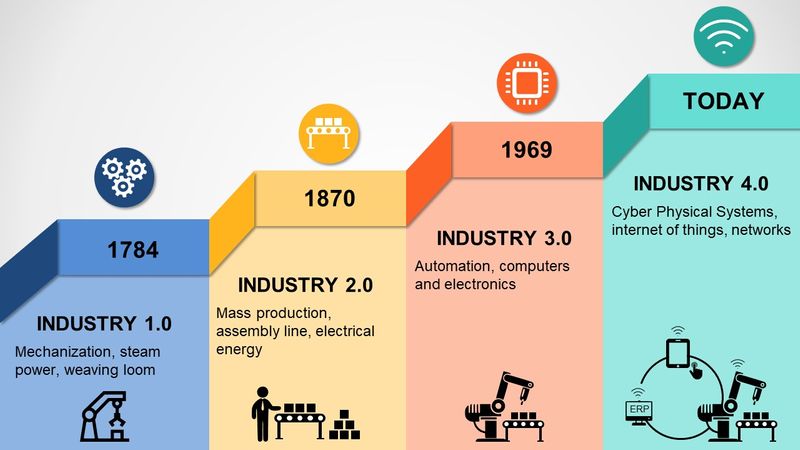
4. KNOW WHERE THE JOBS OF TOMORROW WILL BE
Adoption of new technologies will give rise to greater demand for "green" economy jobs.
So will roles at the forefront of the data and AI economy as well as new roles in engineering, cloud computing and product development.
133 million
Number of jobs expected to be created by the Fourth Industrial Revolution, between 2018-2022, according to a 2018 'WEF Future of Jobs' reportFor bleeding heart liberals out there, here's one clincher from the report: For every job that disappears, more jobs are created.
A "baseline" estimate of 133 million new jobs will be created during the five-year period from 2018 to 2022.
Out of the 133 million projected job creations, 6.1 million jobs are going to be in “emerging professions”, which will most likely become evident during three-year period from 2020-2022, stated the WEF Report.
75 million
number of jobs expected to be displaced over the 2018–2022 period, according to a WEF study.At current growth trends, 1.7 million new jobs will be created this year (2020). By 2022, there will be 2.4 million new job opportunities, a 51% spike from 2020 levels.
So, like it or not, job losses will happen. Many of those unkind cuts will be triggered by tech disruption.
But, like it or not, there's going to be a net creation of 58 million new jobs that need to be filled, too.
Out of this total "job churn", the report estimates that in 2018, wholly new roles accounted for 16% of all jobs— a share that will rise to 27% by 2022.
Further, this net positive job outlook will be concentrated in a set of newly emerging professional clusters.
5. JOB CLUSTERS
The report outlines seven (7) "profession clusters" where the most in-demand jobs will emerge. These seven key professional clusters are emerging in tandem:
- Care Economy (37%)
- Sales, Marketing and Content (17%)
- Data and AI (16%)
- Engineering and Cloud Computing (12%)
- Product development (8.1%)
- People and Culture (8%)
- Green professions (1.9%)
6. HUMAN INTERACTION WON'T GO AWAY
Human interaction won't go away. In fact, it will just increase with technology and longer life expectancies. People in care roles will account for the lion's share of new jobs, states the WEF report.
The AI economy is expected to lead to a skills shortage of up to 50,000. Cloud computing, no doubt, will create fresh jobs.
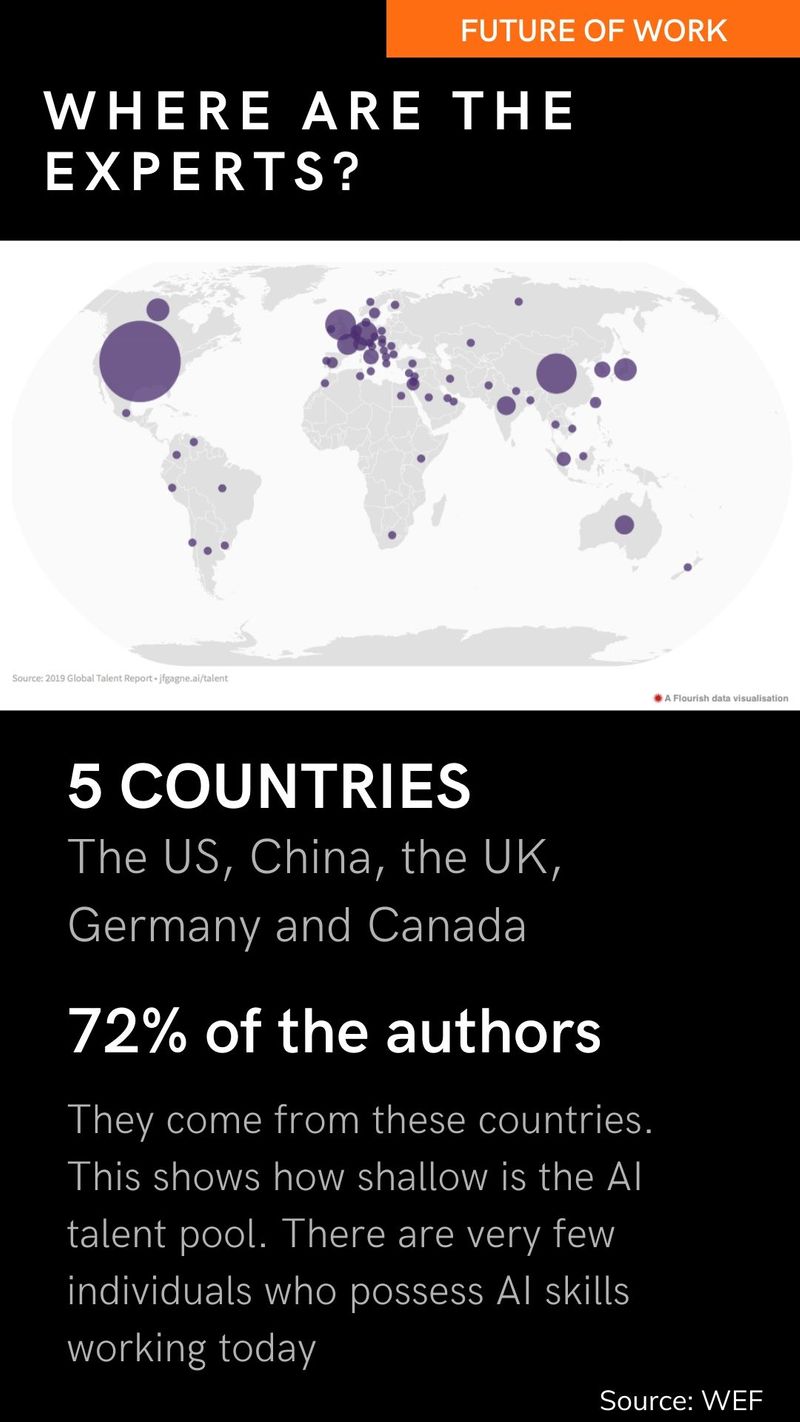
But emerging professions also reflect the continuing importance of human interaction — giving rise to greater demand for care economy jobs; roles in marketing, sales and content production; as well as roles at the forefront of people and culture.
"Indeed, the future of work shows demand for a broad variety of skills that match these professional opportunities, inclusive of both disruptive technical skills but also specialized industry skills and core business skills," the report states.
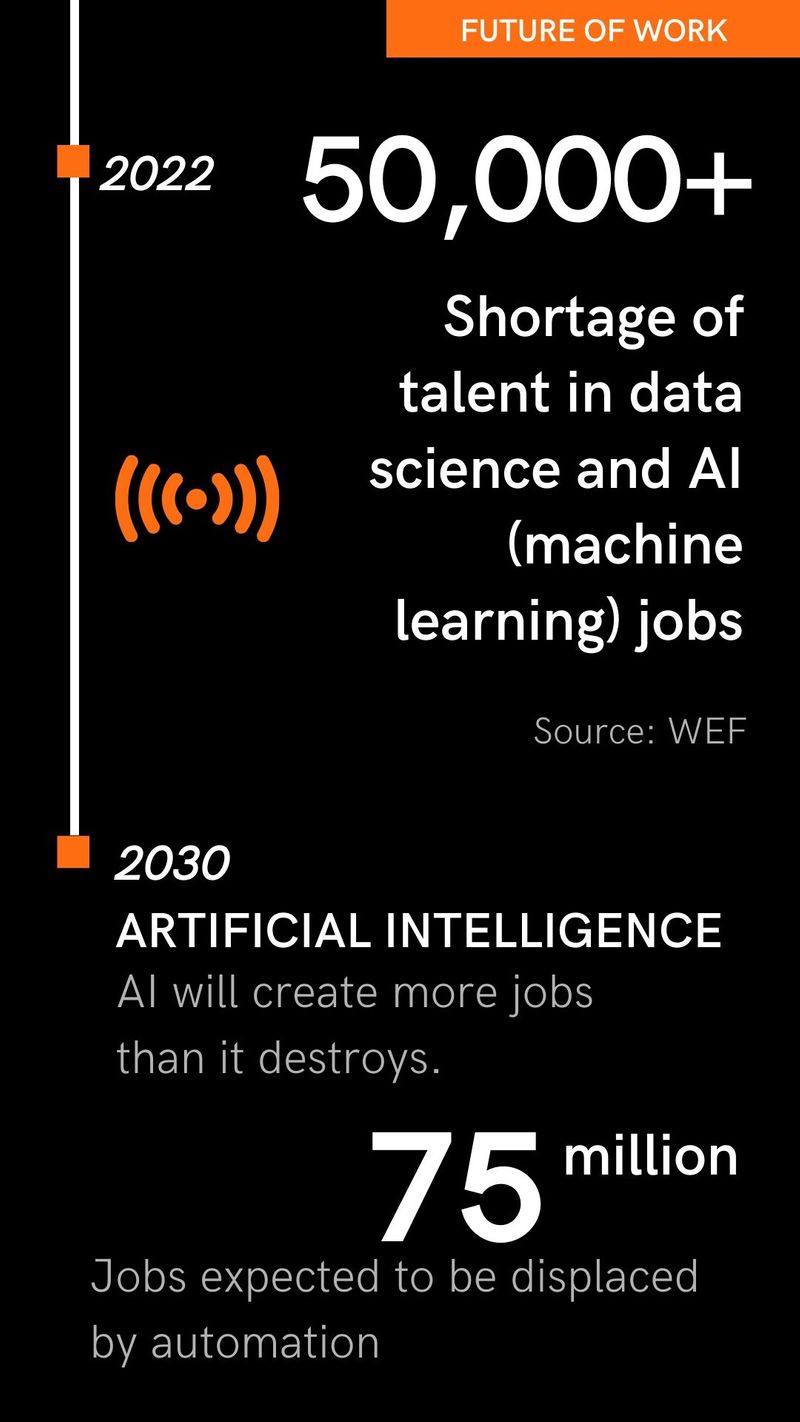
7. HIGH-VOLUME JOBS
The roles with the highest rate of growth within high-volume jobs include:
- Artificial Intelligence Specialists
- Medical Transcriptionists
- Data Scientists
- Customer Success Specialists and Full Stack Engineers.
8. LOWER-VOLUME JOBS
Within lower-volume jobs, the highest growth is in:
- Landfill Biogas Generation System Technicians
- Social Media Assistants
- Wind Turbine Service Technicians
- Green Marketers
- Growth Hackers (see Fact File)
9. IN-DEMAND BUSINESS SKILLS
These are the core skill sets that won't go away. Reason: They remain in-demand skills that underwrite the high-tech, high-growth professions (Data and AI and Engineering and Cloud Computing). These skills sets can be divided into five distinct skills clusters:
- Business Skills,
- Specialized Industry Skills
- General and Soft Skills
- Tech Baseline Skills
- Tech Disruptive Skills
'Re-skilling Revolution'
How do we make sense of these on-going and impending disruptions in the global jobs scene?
The WEF report calls for the creation of a “Reskilling Revolution” and new opportunities for as many as one billion people in the global labour market over the next 10 years.
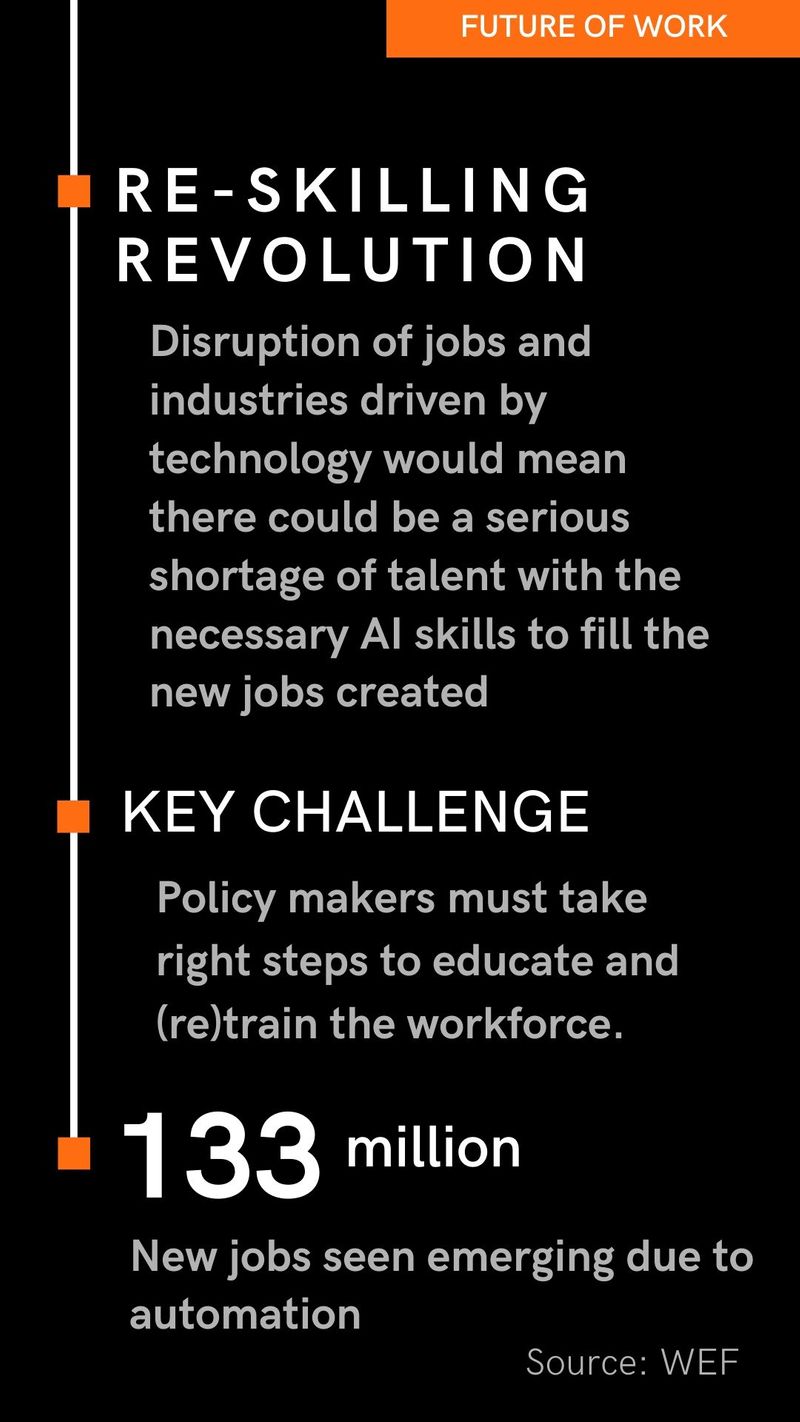
If you don't put all those muscles and brain power to work, they will get bored, and probably make themselves busy taking the path of destruction, instead of creation.
Consider this: Social unrest is rising across much of the industrialised and emerging world.
Young people everywhere call for greater transparency, demand a better life, more accountability and greater over-all well-being.
In a word: Happiness.
WEF suggests that for these challenges to be met, more collaboration between the public and private sectors must be made.
A greater push is necessary to advance a more inclusive agenda — "one in which people’s futures as well as global economic prospects are enhanced by mobilising worldwide mass action on better education, jobs and skills," it concluded.




